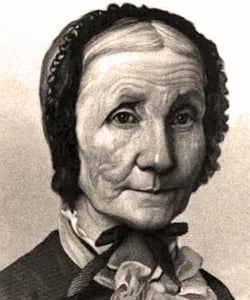OUR STORY
How did Haviland get its name?
The name of Haviland came to prominence in the State of Kansas after a settlement of pioneers in Kiowa County named their church organization after a Michigan Quaker woman named Laura S. Haviland. The life and influence of this woman prompted the choice. Liberty Monthly Meeting of Friends was organized in 1885, and was changed to Haviland Monthly Meeting a year later. The Haviland Town Company was formed in May, 1886 and the charter filed for the organization of Haviland, Kansas on July 12, 1886.
Laura was born in Kitley Township, Ontario, Canada, December 20, 1808 to Daniel and Sene Smith. Her father was a recorded minister and her mother an elder in the Society of Friends in New York state. When she was sixteen Laura met Charles Haviland and the couple exchanged vows in 1825 in the Friends Meeting according to the marriage service in use by that Society. In addition to their own six children, Laura and Charles provided a home for many orphan children at different periods of their life together.
The Havilands started many schools for indigent children and aided other Friends in training children to become useful men and women. Assisted by Laura's brother, they started the first school in the young state of Michigan. Their main purpose was to train individuals who would teach without racial prejudice. Both white and colored pupils enrolled in the school.
During the busy years of rearing a family and starting schools she was also active in helping fugitive slaves and continued her work even after her husband's death in 1845. Her children were grown by the time the slavery issue erupted in a full-scale Civil War and Laura assigned her educational responsibilities to others and went into the south.
Traveling with the Union Army, her determined efforts secured supplies for both soldiers and slaves. Many times, she went ahead of the lines in helping homeless negroes. Her compassionate concern led her to care for wounded soldiers on battlefields and in hospitals and to visit in southern army prisons. Laura Haviland was motivated by love and indomitable courage as she risked her life in selfless devotion to the cause she advocated.
Before her death in 1898, her experiences included pleasant months spent in England. Her adopted city, Adrian, Michigan, has documentary tributes in its library and has erected a statue honoring her memory.
Although Laura Haviland was of Quaker background and belief, her long life of humanitarian service included years during which she was affiliated with the Methodist denomination. It is appropriate that Haviland has two congregations - the Friends Church and the United Methodist Church.
Laura Haviland's book, entitled "A Woman's Life Work", is available at the Haviland Library. It is a revealing record of personal activity and includes many historical events not found in any other volume.
Haviland is proud to bear the name of a lady who was stirred by desperate needs - impelled by a challenging vision - sustained by a vital faith.



